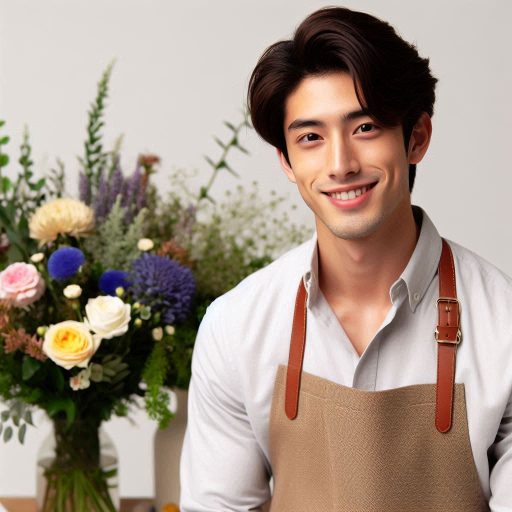Introduction
An event designer is responsible for creating the overall look and feel of an event, including decorations, lighting, and layout.
They play a crucial role in bringing the client’s vision to life.
Event designers are essential in the industry as they help provide a unique and unforgettable experience for attendees.
Their creativity and attention to detail are what set events apart.
Pros of becoming an Event Designer
Creative outlet
As an event designer, you have the ability to design and create unique events that showcase your creativity and originality.
You can bring your artistic vision to life and make each event special and memorable for your clients.
Flexibility in work schedule
One of the major benefits of being an event designer is the flexibility in your work schedule.
You have the opportunity to take on freelance projects, which allows you to work on your own terms and choose the projects that interest you the most.
This flexibility enables you to maintain a better work-life balance and pursue other interests outside of work.
Networking opportunities
Working as an event designer provides you with ample opportunities to network and connect with vendors and clients in the industry.
Building strong relationships with other professionals in the event planning world can open doors to new collaborations, partnerships, and projects.
Networking can also help you stay updated on industry trends and advancements, ultimately enhancing your skills and expanding your clientele.
Overall, becoming an event designer offers a dynamic and fulfilling career path that allows you to express your creativity, enjoy flexibility in your work schedule, and build a strong network of industry connections.
By embracing these advantages, you can thrive in the fast-paced and exciting world of event design.
Read: Networking Tips for Aspiring Floral Designers
Cons of becoming an Event Designer
High stress levels
Event designers are often juggling multiple projects at once, each with its own set of deadlines.
This can lead to high levels of stress as they try to meet the demands of their clients while maintaining a high standard of quality for each event.
Unpredictable income
One of the downsides of being an event designer is the fluctuating workload and pay that comes with the job.
Some months may be busier than others, leading to inconsistent income and financial uncertainty.
Long hours
Event designers are no strangers to working long hours, often putting in extra time in the evenings and weekends to prepare for and execute events.
Transform Your Career Today
Unlock a personalized career strategy that drives real results. Get tailored advice and a roadmap designed just for you.
Start NowThis can lead to burnout and a poor work-life balance.
In essence, while being an event designer can be a rewarding and creative career choice, it also comes with its fair share of challenges.
From high stress levels and unpredictable income to long hours, individuals considering this profession should weigh the pros and cons carefully before diving in.
Read: Fashion Design: Freelance vs. Full-Time
Education and training required
Degree in event management, hospitality, or related field
Aspiring event designers need to acquire the necessary education and training to excel in the field.
A degree in event management, hospitality, or a related field is typically required to kickstart a career in event design.
This foundational knowledge provides the essential skills and expertise needed to plan and execute successful events.
Internship or work experience in event planning
In addition to formal education, gaining practical experience through internships or work opportunities in event planning is invaluable.
This hands-on experience allows aspiring event designers to learn the ropes of the industry, develop their skills, and build a network of contacts that can be beneficial in their career.
Continued education and training to stay current in the field
Furthermore, the field of event design is constantly evolving, with new trends, technologies, and techniques emerging regularly.
Therefore, continued education and training are essential for event designers to stay current and competitive in the industry.
Engaging in workshops, seminars, and conferences can help professionals learn about the latest practices and innovations in event design, ensuring they deliver high-quality experiences to their clients.
Overall, a solid educational background, practical experience, and a commitment to ongoing learning are crucial for individuals looking to succeed as event designers.
By investing in their education and training, aspiring professionals can enhance their skills, expand their knowledge, and position themselves for a successful and fulfilling career in the dynamic field of event design.
Read: Understanding Fashion Design Internships

See Related Content: Networking Tips for Aspiring Art and Design Curators
Skills needed for success
When it comes to becoming an event designer, there are several skills that are crucial for success in this field.
Strong attention to detail
Having these skills is essential for anyone looking to thrive in the world of event design.
Without them, it can be challenging to meet the demands and expectations of clients and deliver exceptional results.
Showcase Your Business Today
Reach thousands of readers actively exploring professional services. Publish your business profile and grow your audience now.
Publish NowEvent designers need to pay attention to even the smallest details, from the color of the flowers to the placement of the table settings.
This level of precision can make or break an event, so having a strong attention to detail is non-negotiable.
Excellent communication and negotiation skills
Communication is a key aspect of event design, as designers must work closely with clients to understand their vision and bring it to life.
Effective communication skills are essential for conducting meetings, presentations, and negotiations with clients and vendors.
Ability to work under pressure and problem-solve quickly
Events often come with unexpected challenges and last-minute changes, so being able to work well under pressure is a must for event designers.
Quick problem-solving skills are crucial in handling any issues that may arise during an event, ensuring that everything runs smoothly.
Overall, the combination of attention to detail, communication skills, and the ability to work under pressure is what sets successful event designers apart from the rest.
These skills are the foundation for creating unforgettable and flawless events that leave a lasting impression on clients and guests alike.
Read: Balancing Creativity and Business in Fashion
Find Out More: Day in the Life of a Professional Concept Artist
Job outlook and opportunities in the industry
Growth in the event planning industry
The event planning industry has experienced significant growth in recent years.
Demand for event designers continues to rise as businesses, couples, and organizations seek creative, memorable experiences.
This trend is expected to continue, providing job security and increasing opportunities.
Opportunities for specialization in corporate events, weddings, or non-profit events
One major advantage of event design is the ability to specialize.
Corporate events offer a path for those who enjoy business-related functions.
Event designers in this field plan conferences, product launches, and team-building activities.
Specializing in corporate events often leads to higher-paying opportunities and long-term partnerships.
Wedding event design is another growing sector.
Couples desire unique, personalized experiences, giving wedding designers room for creative expression.
This niche allows for consistent business, especially during peak wedding seasons, providing stable income streams for event designers.
Non-profit events also offer opportunities for specialization.
Event designers working with non-profits plan fundraisers, galas, and community events.
This path often provides personal fulfillment, as designers contribute to causes they care about while enhancing their portfolios.
Potential for advancement to event planning director or manager roles
Event designers have the potential for career advancement.
Experienced designers can become event planning directors or managers, overseeing teams and coordinating large-scale projects.
These roles come with higher salaries and increased responsibility, offering long-term career growth.
The event design industry continues to expand, and with the right skills and creativity, designers can thrive in various specializations.
Advancement opportunities and job security make this field an attractive option for creative professionals seeking diverse and fulfilling career paths.
Conclusion
When considering becoming an event designer, it is important to weigh the pros and cons carefully.
On one hand, the creative freedom, opportunity to work with a diverse range of clients, and the satisfaction of seeing your designs come to life are all attractive aspects of the job.
However, the long hours, high stress levels, and competition in the industry are important factors to consider as well.
It is crucial for individuals to assess their skills, interests, and willingness to handle the demands of the job before pursuing a career in event design.
[E-Books for Sale]
The Big Book of 500 High-Paying Jobs in America: Unlock Your Earning Potential
$19.99 • 500 High-Paying Jobs • 330 pages
Explore 500 high-paying jobs in America and learn how to boost your career, earn more, and achieve success!
See All 500 High-Paying Jobs of this E-Book
1001 Professions Without a Degree: High-Paying American Jobs You Can Start Now
$19.99 • 1001 Professions Without a Degree • 174 pages
Discover 1001 high-paying jobs without a degree! Unlock career tips, skills, and success strategies for just $19.99!




